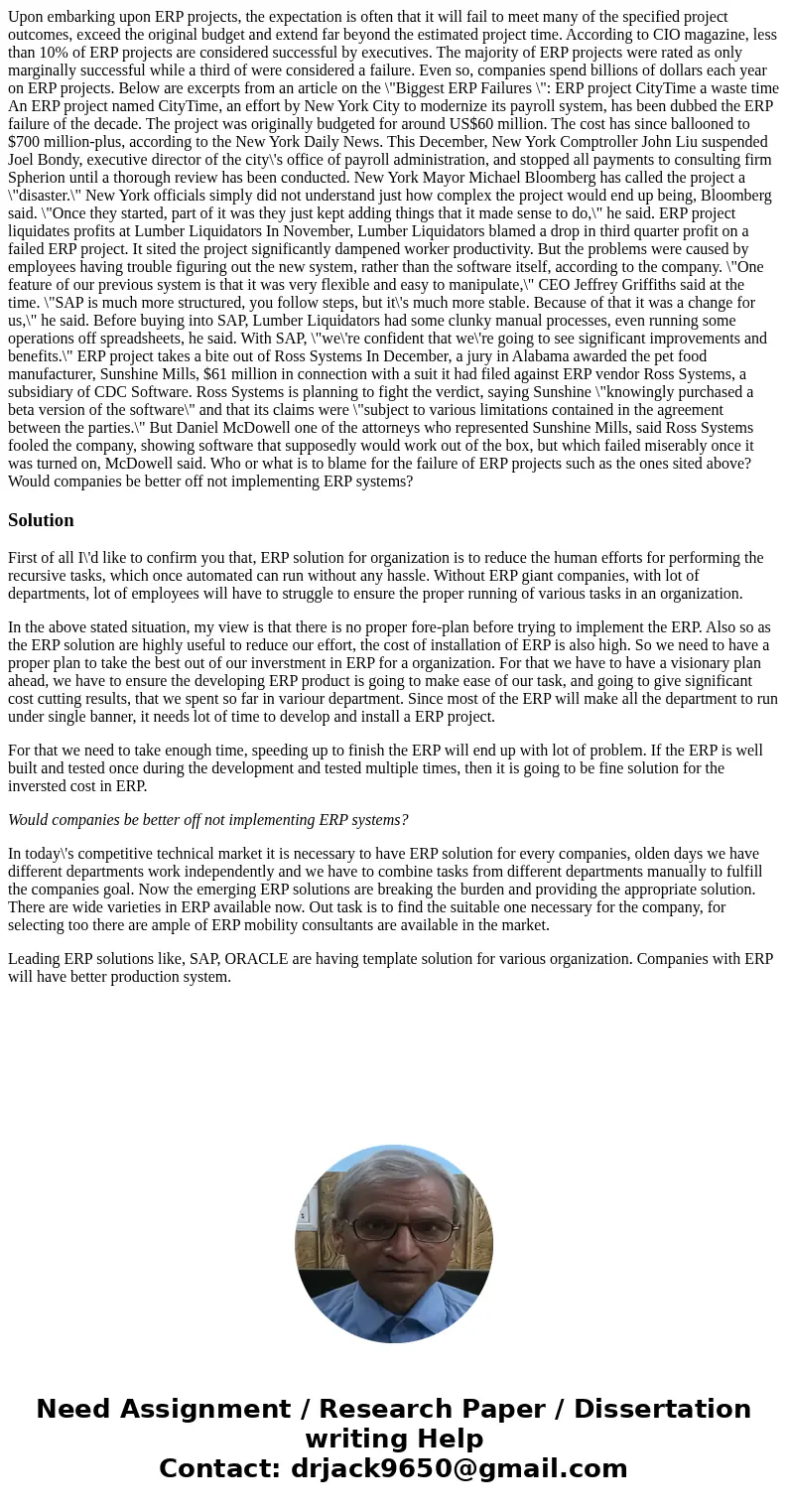Upon embarking upon ERP projects the expectation is often th
Upon embarking upon ERP projects, the expectation is often that it will fail to meet many of the specified project outcomes, exceed the original budget and extend far beyond the estimated project time. According to CIO magazine, less than 10% of ERP projects are considered successful by executives. The majority of ERP projects were rated as only marginally successful while a third of were considered a failure. Even so, companies spend billions of dollars each year on ERP projects. Below are excerpts from an article on the \"Biggest ERP Failures \": ERP project CityTime a waste time An ERP project named CityTime, an effort by New York City to modernize its payroll system, has been dubbed the ERP failure of the decade. The project was originally budgeted for around US$60 million. The cost has since ballooned to $700 million-plus, according to the New York Daily News. This December, New York Comptroller John Liu suspended Joel Bondy, executive director of the city\'s office of payroll administration, and stopped all payments to consulting firm Spherion until a thorough review has been conducted. New York Mayor Michael Bloomberg has called the project a \"disaster.\" New York officials simply did not understand just how complex the project would end up being, Bloomberg said. \"Once they started, part of it was they just kept adding things that it made sense to do,\" he said. ERP project liquidates profits at Lumber Liquidators In November, Lumber Liquidators blamed a drop in third quarter profit on a failed ERP project. It sited the project significantly dampened worker productivity. But the problems were caused by employees having trouble figuring out the new system, rather than the software itself, according to the company. \"One feature of our previous system is that it was very flexible and easy to manipulate,\" CEO Jeffrey Griffiths said at the time. \"SAP is much more structured, you follow steps, but it\'s much more stable. Because of that it was a change for us,\" he said. Before buying into SAP, Lumber Liquidators had some clunky manual processes, even running some operations off spreadsheets, he said. With SAP, \"we\'re confident that we\'re going to see significant improvements and benefits.\" ERP project takes a bite out of Ross Systems In December, a jury in Alabama awarded the pet food manufacturer, Sunshine Mills, $61 million in connection with a suit it had filed against ERP vendor Ross Systems, a subsidiary of CDC Software. Ross Systems is planning to fight the verdict, saying Sunshine \"knowingly purchased a beta version of the software\" and that its claims were \"subject to various limitations contained in the agreement between the parties.\" But Daniel McDowell one of the attorneys who represented Sunshine Mills, said Ross Systems fooled the company, showing software that supposedly would work out of the box, but which failed miserably once it was turned on, McDowell said. Who or what is to blame for the failure of ERP projects such as the ones sited above? Would companies be better off not implementing ERP systems?
Solution
First of all I\'d like to confirm you that, ERP solution for organization is to reduce the human efforts for performing the recursive tasks, which once automated can run without any hassle. Without ERP giant companies, with lot of departments, lot of employees will have to struggle to ensure the proper running of various tasks in an organization.
In the above stated situation, my view is that there is no proper fore-plan before trying to implement the ERP. Also so as the ERP solution are highly useful to reduce our effort, the cost of installation of ERP is also high. So we need to have a proper plan to take the best out of our inverstment in ERP for a organization. For that we have to have a visionary plan ahead, we have to ensure the developing ERP product is going to make ease of our task, and going to give significant cost cutting results, that we spent so far in variour department. Since most of the ERP will make all the department to run under single banner, it needs lot of time to develop and install a ERP project.
For that we need to take enough time, speeding up to finish the ERP will end up with lot of problem. If the ERP is well built and tested once during the development and tested multiple times, then it is going to be fine solution for the inversted cost in ERP.
Would companies be better off not implementing ERP systems?
In today\'s competitive technical market it is necessary to have ERP solution for every companies, olden days we have different departments work independently and we have to combine tasks from different departments manually to fulfill the companies goal. Now the emerging ERP solutions are breaking the burden and providing the appropriate solution. There are wide varieties in ERP available now. Out task is to find the suitable one necessary for the company, for selecting too there are ample of ERP mobility consultants are available in the market.
Leading ERP solutions like, SAP, ORACLE are having template solution for various organization. Companies with ERP will have better production system.

 Homework Sourse
Homework Sourse